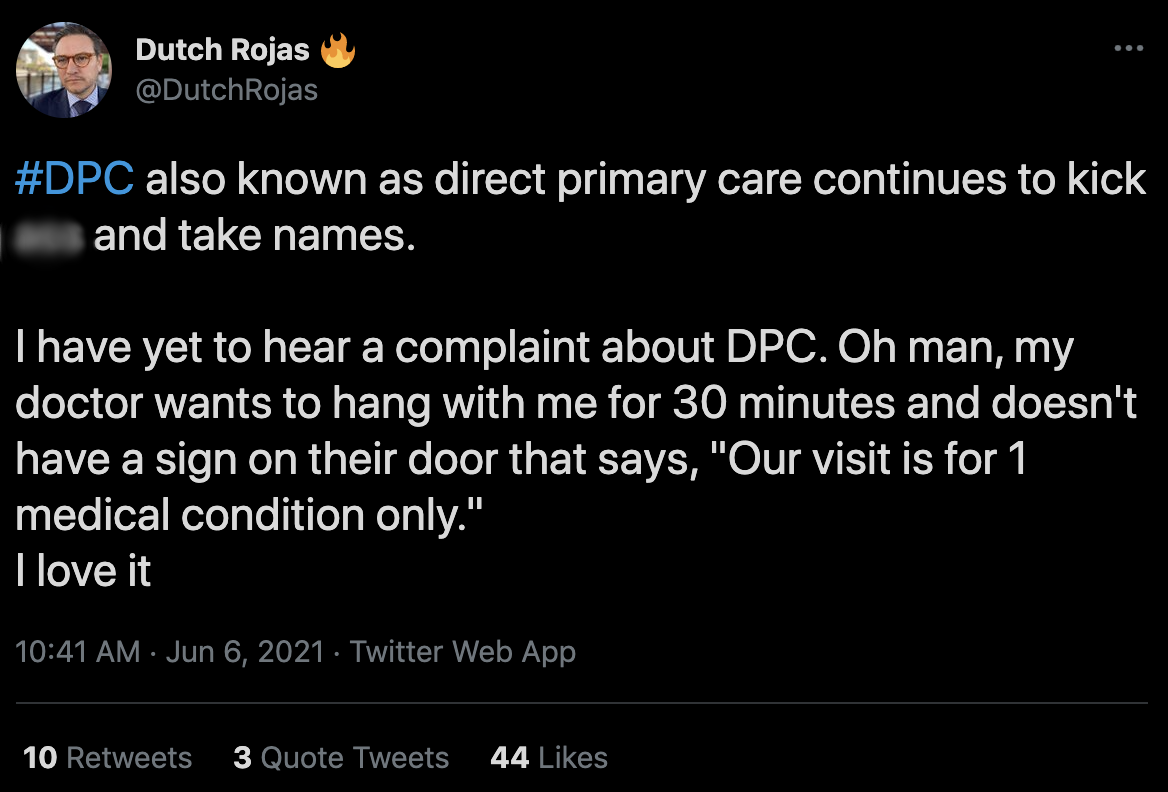Insurance Brokers Should Be Selling DPC to Self-Funded Groups
June 9, 2021
Insurance brokers know, and so do their clients: Healthcare costs continue to rise every year.
It would be wrong to say that insurance brokers have it easy trying to sell health insurance in the current market. In 2021, the Insurance Information Institute estimates that healthcare spend in the US is $4.41 trillion. Out of that, it’s estimated by the Peter G. Peterson Foundation that a third of it is wasted on unnecessary healthcare services. And given that our current healthcare system doesn’t encourage prevention and wellness, it’s not surprising that only 6% of healthcare costs go to primary care. A whopping 38% of healthcare costs go to hospital care (according to the Patient-Centered Primary Care Collaborative and the Robert Graham Center).
Self-funded companies got fed up with spending too much on premiums. They pulled the plug, and essentially became their own insurance company, only paying for what they need. What if you could come in and make their healthcare spend even less?
Companies with self-funded plans want fewer claims and more employees on high-deductible plans. This is your major opportunity to pitch what most insurance brokers aren’t even aware of – that’s Direct Primary Care (DPC).
Helping Insurance Brokers Understand Direct Primary Care
We’ll start with a tweet.

Long, focused visits with your provider is one benefit of Direct Primary Care. That, in and of itself, trickles down and creates many more health benefits for patients.
How it works: Direct Primary Care is a primary care membership. The modest monthly membership fee is paid directly to Primary Care Providers (PCP) for unlimited access to them. It’s paying for access versus paying per service. For primary care through DPC, individuals don’t ever pay co-pays and aren’t working to meet a deductible.
In this healthcare model, prevention and wellness take priority. Helping foster the patient-provider relationship achieves this. With more and easier access to their provider, patients develop a long-term relationship that focuses on genetics, medical history, lifestyle, and more. Providers have more time to get to know the patient, working on the source of medical issues versus traditional care, where patients get a ten-minute appointment and prescription write-up for symptoms.
This type of care also maintains health and works toward prevention, making serious, expensive health complications in the future less likely. Round-the-clock access to care also means it’s less likely employees will make trips to urgent care or the ER – the most expensive care available.
Direct Primary Care takes insurance out of primary care, yet it’s not a health insurance replacement. It’s a cost-effective integration, most typically with high-deductible health plans (HDHP).
Because DPC is a direct contract with the provider versus insurance, it eliminates claims on primary care and creates the opportunity for a predictable, transparent, upfront healthcare spend on primary care.
Yes, DPC eliminates claims on primary care and reduces urgent care and ER claims.
View our white paper to see real results!
Second to claims, self-funded companies want their employees to opt-into the HDHP so their employees pay much of their healthcare costs themselves. A HDHP with Direct Primary Care custom integration makes it more likely that their employees will. This is not only a major benefit to your clients, however. Their employees will have 100% of their primary care covered through their Direct Primary Care membership and will pay less money every month for their HDHP premium. Many times, employees get wholesale pricing on labs, negotiated cash pricing on specialists, and their providers help them access the most affordable prescriptions. In-depth relationships and round-the-clock access, as aforementioned, also means more health and less complications in the future.
How Insurance Brokers can Integrate DPC into a Plan Design
Let’s compare costs with a realistic example.

This chart shows how HDHP + DPC can work together to cut costs versus traditional Preferred Provider Organization health insurance plans (PPO). You’ll see that in this example, the employer saves $176 outright per month. And again, with DPC, they’ll have fewer claims and more employee health, making even more savings down the line.
How can I prove increased health and reduced claims to clients?
When you partner with Strada Healthcare, the premier physician-owned network of Direct Primary Care providers, you are provided sophisticated data reporting and analytics that prove increased health and costs cut in exact numbers.
The core integrations included are electronic medical reports, DPC membership billing platforms, virtual communication tools, and claims data (if made available). We consolidate this data to make it easier for your client to draw applicable conclusions.
Next, Strada Healthcare offers advanced integrations that can accommodate your needs.
These integrations help your client gain a more comprehensive understanding of their employees’ health. This includes health information exchanges, patient satisfaction surveys, biometrics, wearable devices, and patient engagement platforms.
Lastly, Strada Healthcare offers dashboards and reporting. This is done in creative ways to help your client draw conclusions about operational, clinical, and financial performance. Strada Healthcare can help your client make strategic decisions about their primary care strategy. We do this by sharing data-driven reports and seamlessly integrated solutions with you.
For more information, please contact us here.

